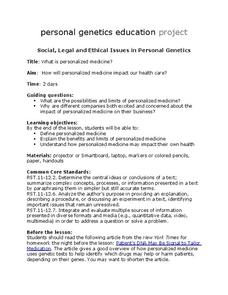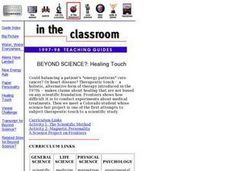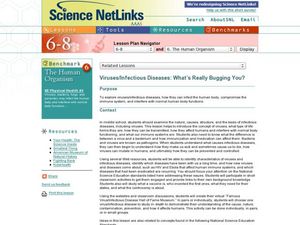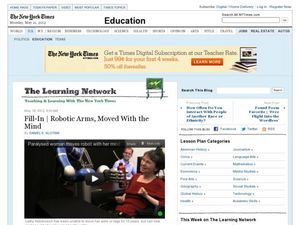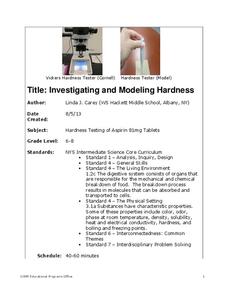Howard Hughes Medical Institute
How Novel Icefish Genes Can Improve Human Health
Designed to accompany the 13-minute video The Making of the Fittest: The Birth and Death of Genes, this handout serves as both a viewing guide during the video and an analysis of how the adaptations of the icefish might help treat some...
Personal Genetics Education Project
Personalized Medicine
Genetics learners read an article and watch a video about personalized medicine and the hope it holds for treating patients more specifically than doctors currently are able to. They research, design, and produce a brochure about the...
Curated OER
Medical Consultation Role Play
Students, with an emphasis on problem solving, students given a patient with some background information and symptoms. It is up to a pair of students to diagnose their patient and then inform the relatives of the patient about the...
Curated OER
Beyond Science?: Healing Touch
Students apply the scientific method by building a "Proposal for Study." They label the Observation, Hypothesis, and Prediction columns. Students listen as the teacher introduces the alternative healing methods of therapeutic touch and...
Curated OER
Tech: Medical Forensics
High schoolers explore what it takes to be a forensic scientist or pathologist. They view a PowerPoint, discuss what education and skills are needed to succeed as a pathologist. They play a game to test their observation skills, a skill...
Curated OER
Phineas Gage: “Medicine: Then and Now” Pre-Reading Activity
What did medicine look like a hundred years ago? Two hundred years ago? Invite small groups to conduct research on the history of a chosen medical advancement before reading Phineas Gage: A Gruesome but True Story About Brain Science....
Virginia Department of Education
Atomic Structure: Elements
It's all relevant, really. Individuals use the scientific method to learn more about elements, atoms, and their placement on the periodic table. They conduct experiments using materials common in nature to explore how elements affect our...
Learning Games Lab
Gram Staining
Scholars use a lab simulation to test contaminated yogurt for bacteria by gram staining. They learn proper lab procedures for handling bacteria and for sterilizing equipment, and then walk through the process on their own to try gram...
Learning Games Lab
Controlling Water Activity in Food
Food storage matters! Scholars learn how the amount of water in corn can affect its rate of spoilage. They create a control group, then test three corn samples stored in three different locations for water activity. As a result of the...
Learning Games Lab
How to Use Oil Immersion Microscope
Teach the class how to use a microscope to identify bacteria in food. Scholars explore the different parts of the microscope and learn how to determine total magnification. They walk step-by-step through the procedure of preparing slides...
Learning Games Lab
The pH Scale and Meter Calibration
What are the different ways to test for pH? First, scholars explore the pH scale and a common way to test for acidity and alkalinity. Then, they learn about the importance of pH in food safety and why variance in pH could potentially...
Learning Games Lab
Testing and Adjusting pH
Pupils learn how to control food spoilage by adjusting the food's pH. They see that one of the most dangerous bacteria can grow in food if people don't handle and store food properly. Using knowledge of the bacteria's preferred pH,...
Baylor College
Making Copies of an HIV Particle
In the second of five lessons about HIV, discover the mechanisms that allow the HIV virus to replicate. Using the models that they created the day before, learners examine the parts of the virus particle. The lesson plan does not say...
Curated OER
Viruses/Infectious Diseases: What's Really Bugging You?
Middle school life science or health classes listen to an audio, visit websites, read different articles, and participate in a class-wide simulation about the spread of viruses. The lesson doesn't get into the mechanics of how viruses...
Curated OER
Medicine: Then and Now
Young scholars read ancient Greek texts to explore ancient healing practices and compare them to modern-day medicine. They conduct research into modern first-aid practices, using a standard medical reference.
Curated OER
Brain-Controlled Robotic Arms: Cloze activity with Article
Fascinating content about current medical research on brain-controlled prosthetics comes in cloze activity form with a link to the original article. Useful for listening and reading comprehension skills development, and for any science...
Baylor College
Calculating Exponential Growth
There can be a steep learning curve when teaching about exponential growth, but the lesson helps kids make sense out of the concept. When talking about exponential growth of viruses, learners may not be very interested, but when you are...
Baylor College
HIV/AIDS in the United States
In the final of five lessons about HIV/AIDS, groups create presentations to share data about the infection rates in the United States, examining demographic and geographic trends over the past ten years. Depending on how much time you...
American Chemical Society
Man and Materials Through History
From the start of the Industrial Revolution, it only took 147 years for someone to invent plastic. This may seem like a long time, but in the history of inventing or discovering new materials, this is incredibly fast. An informative and...
Cornell University
Investigating and Modeling Hardness
Model hardness testing with a self-designed hardness test. Young scholars rate the hardness of different types of aspirin using the Vicker's Hardness scale. They then relate hardness to the solubility of each aspirin tablet.
Learning Games Lab
Bacteria Sampling
Scholars explore the procedure for bacteria sampling in a virtual lab by first walking through a detailed step-by-step procedure of preparing the samples of raw milk and pasteurized milk, growing the bacteria, and comparing results....
Curated OER
Mitosis and Cancer - Biology Teaching Thesis
Observe onion root cells undergoing mitosis underneath a light microscope and determine the phase of mitosis the cells are in. High schoolers draw a sketch of the mitotic cells, explore why cells undergo mitosis and learn how...
Beyond Benign
ACNE (Another Cat Needs Exfoliation)
Take solace, teens ... cats get acne, too! After making a diagnosis in the previous lessons in the series, learners must now decide on a treatment to complete the sixth installment of this biotechnology unit. The typical treatment for...
Beyond Benign
Urine Jeopardy
Urine can tell us a lot about what is happening in our bodies. In a hands-on activity, scholars administer pH, glucose, ketone, and protein tests to a sample of "urine" solution made from household ingredients. Their results lead them to...



